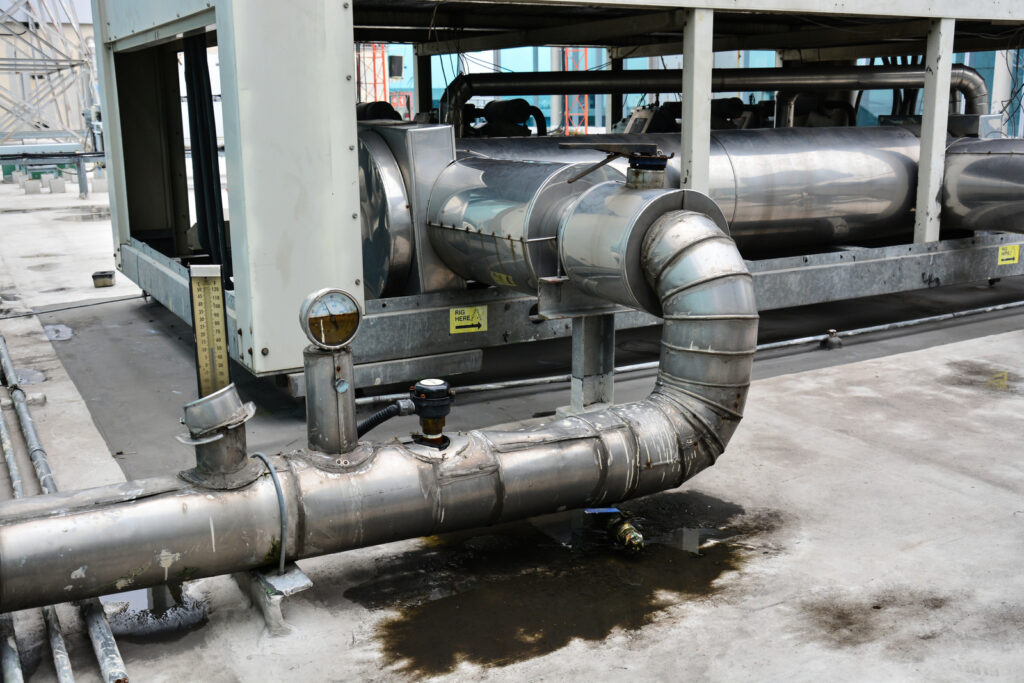The HVAC industry relies on components that are assembled to work flawlessly. Every house, business, or building requires an individual design for its HVAC system, and sheet metal provides the perfect amount of customizability to achieve the perfect results.
Every industry has taken advantage of the great properties of sheet metal fabrication to manufacture different components for their business needs. Just like that, sheet metal fabrication also benefits the HVAC industry with its versatility and durability.
This article discusses the advantages of sheet metal fabrication in the HVAC industry along with its applications.
How is Sheet Metal Used in the HVAC Industry?
Sheet metal fabrication is used for many components in the HVAC industry. Each type of sheet metal is used for its varying heat-resistance or heat-transferring properties. Steel, aluminum, and copper are the most used sheet metals in the HVAC industry.
Here are some applications of sheet metal in the HVAC industry.
Ductwork
A typical HVAC system’s main job is to move air between outdoor or indoor spaces to make certain buildings cool or warm. The pathway through which the cooled air from the HVAC system passes is called ductwork.
Ductwork is an important part of an HVAC system because the whole ventilation, heating, or air conditioning relies on the ducts. Therefore, the material used for ducts should be heat-resistant.
Sheet metals like copper, aluminum, and steel are often the common choice for ductwork since they are great at transferring heat. This means this material can heat up and cool down quickly instead of overheating.
Ductwork made from galvanized steel is made with a zinc coating to help prevent corrosion and rust build-up. Whereas aluminum ductworks are lightweight and more energy efficient.
Coils
Inside the HVAC system, the evaporator and condenser coils collaborate to complete the heat-exchange process. These coils are designed to collect heat from the atmosphere’s air. This is where the chilly air originates from in the system.
These coils are composed of copper, aluminum, or steel since these sheet metals transfer heat well.
Stainless steel coils are long-lasting and corrosion-resistant, making them an excellent choice for harsh settings. Coils constructed of aluminum, on the other hand, can improve heat transmission efficiency.
Sheet metals have a high tensile strength and can limit the chance of leaks in evaporator coils, making them a common choice for making these coils.
Roof Curb
Roof curbs are rooftop surface areas for mounting the HVAC equipment. They play a significant role in the efficiency of an HVAC system while also protecting the roof and equipment.
Roof curbs are commonly made from galvanized steel, stainless steel, and aluminum. These metals are known for their ability to bear heavy loads which makes them a suitable option for roof curbs because they hold the whole equipment and ductwork of the HVAC system.
Refrigerant Lines
Refrigerant lines are an important component of an HVAC system and without them, air conditioning isn’t possible. The refrigerant lines are made using sheet metals like copper or aluminum due to their lightweight and corrosion resistance abilities.
Unlike aluminum, copper is not as strong as aluminum, however, its highly resistant to rust and corrosion. Moreover, both of these have high ductility which is a major reason why HVAC contractors use these materials for making refrigerant lines.
These can be easily formed into shapes and pulled into thin wires while still being a great conductor of heat.
Advantages of Sheet Metal Fabrication
Customizability
Sheet metal fabrication in HVAC allows clients to custom design the way their ductwork looks. The ductwork in any building can be completely hidden or painted to fit the aesthetics of the interior design.
Sheet metal fabrication provides the option for a completely customized HVAC system whether it’s for a building, home, or a small office. Advanced technology and machinery enable businesses to decide the shape and cut of metal parts according to their preferences.
Additionally, when building an extension of an existing work or remodeling, HVAC workers can easily match the pre-existing ductwork thanks to sheet metal fabrication.
The clients have the freedom to choose their preferred design and their desired metal from the variety of different metals that sheet metal fabrication offers.
Cost-Effective
Sheet metal is widely utilized for manufacturing the ductwork of the whole ventilation system in residential ducting due to its affordability. These may be constructed from a number of sheet metals, including lighter alternatives such as aluminum.
However, aluminum can be an expensive choice for some. Therefore, galvanized steel is preferred more due to its affordable as well as durable properties. In addition to the affordable materials, sheet metal fabrication has low production costs.
When compared to importing other materials, sheet metal production is a more cost-effective and time-efficient alternative. Furthermore, produced sheet metal might result in decreased energy expenses for a firm, resulting in long-term cost savings.
To summarize, bespoke sheet metal fabrication is an outstanding cost-effective alternative for businesses and homes seeking a customised solution that may assist save time and money while assuring the finest quality and performance.
Durability and Strength
In the HVAC industry, corrosion is a major concern because it can lead to the deterioration of metal from exposure to different chemical and temperature changes.
This is why sheet metal is an ideal choice for HVAC systems because it is corrosion-resistant and doesn’t rust even if it comes in contact with chemicals. This makes sheet metal fabrication an excellent option as it ensures safety and satisfaction with its durable properties.
Since the HVAC system heavily relies on the transfer of air and fluids, the material used in its components must be durable. Ducts made from aluminum are capable of withstanding high temperatures, reducing the likelihood of bursts or leakages in piping systems.
This is particularly useful for industries that require piping systems to tolerate drastic changes in pressure levels. Sheet metal provides businesses with the assurance that their HVAC systems will not overheat or break down.
Sheet metal fabrication is suitable for HVAC systems due to its ability to transfer heat without damage. For companies searching for robust and dependable HVAC solutions, sheet metal fabrication is a fantastic choice.
Lightweight and Flexible
Sheet metal is pliable, malleable, and strong. Because it can be moulded into virtually any shape, its versatility makes it the ideal material for HVAC systems, allowing up infinite design choices.
Furthermore, sheet metal is lightweight and can withstand high pressures, making it an excellent choice for components that must be moved or transported quickly. A lightweight component, for example, is essential since the HVAC system will be put on the roof at a significant height.
Sheet metal fabrication allows firms to design a system that is tailored to the space they occupy. Sheet metal’s malleability is one of its main selling factors in commercial services since it enables for customisation to fit the individual demands of the customer.
Moreover, its strength and malleability make it a practical and versatile material for a wide range of applications, including the zig-zag pipelines of HVAC systems.
Efficiency and Performance
Sheet metal ductwork can provide a perfect fit for the HVAC system, allowing for efficient airflow without any gaps or leaks. This means that the air is directed exactly where it is intended to go, resulting in quicker and more effective delivery throughout the building.
Badly designed ducts can result in uneven heating or cooling, resulting in needless energy loss as one tries to adjust for the unbalance. Sheet metal can eliminate this concern because the metals are robust as well as corrosion resistant preventing any breakage or leaks.
The airtight nature of sheet metal ductwork is one of the most effective ways to achieve energy efficiency in a commercial building and can guarantee that the HVAC system runs smoothly and effectively for years to come, offering comfort and expense savings.
Maintenance and Repairs
Using sheet metal for the HVAC system can help save money on fixes and replacements. It also enables the HVAC contractors to quickly build required components because sheet metal allows individual parts to be repaired instead of dismantling the whole structure.
Moreover, sheet metal is immune to erosion caused by oxygen exposure, removing the need for continuous maintenance or pipe replacement due to corrosion. HVAC systems made of sheet metal are also simpler to repair because workers can easily access the system via its ducts.
Investing in sheet metal manufacturing guarantees not only simple installation but also long-lasting vents that require fewer repairs, eventually saving money in the long run.
Sustainability
Sheet metal fabrication for HVAC provides sustainability benefits, making it a popular choice for eco-friendly construction solutions. The use of sheet metal in HVAC systems minimizes the demand for energy-intensive cooling and heating.
It also reduces the amount of heat loss or gain from a building with proper design and insulation. This saves energy and reduces greenhouse gas emissions, making it an environmentally friendly option for business and residential constructions.
Furthermore, sheet metal is a reusable material, making it a sustainable alternative. By embracing sheet metal fabrication, businesses may reduce their carbon footprints and contribute to the green economy – striving for safe environment for everyone.
Moreover, sheet metal is sturdy and long-lasting, resulting in less rubbish in landfills from abandoned HVAC systems.
Its durability and recyclability make it an eco-friendly option for businesses looking to minimize their impact on the environment while maximizing their energy efficiency.
Conclusion
Sheet metal fabrication has become popular for delivering the best results to many industries including the HVAC industry because of its endless advantages. Businesses all over the world have recognized sheet metal as their holy grail for B2B manufacturing.
Overall, sheet metal fabrication for HVAC systems is a great choice for businesses because of its cost-effective, lightweight, and durable nature. With its versatile nature and customizability, sheet metal has been benefiting the HVAC industry for years.
If you’re looking for reliable and high-quality B2B manufacturing solutions, look no further than Monster Builder! Our expertise in sheet metal fabrication, CNC machining, and 3D printing makes us the go-to choice for your business needs. Contact us today to learn more!



